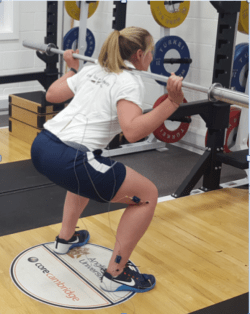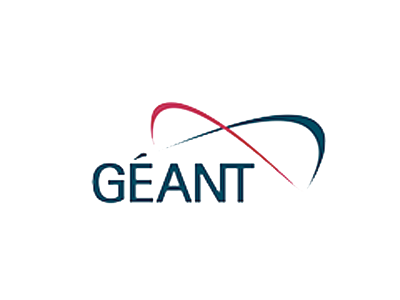
Technology and sports science: a winning team
Technology is rapidly changing the way athletes and sports coaches work together. Accurate feedback, appropriate training, objective and reliable assessment techniques are the main ingredients to maintain and improve performances or to effectively recover from sport injuries.
Remote sensing and data sonification can improve standard data analysis techniques currently employed in some aspects of biomedical science with special reference to sports science and rehabilitation.
A unique infrastructure connected to the world

Coaching session with sensors for data caption and sonification purposes.
At Anglia Ruskin University in Cambridge, UK, this innovative approach is in full swing. The novelty starts with the infrastructure, by linking a cutting-edge sports science lab (the Cambridge Centre for Sport and Exercise Science) with the state-of-the-art Sound and Game Engineering lab, and by connecting them to the pan-European GÉANT network via the UK research and education network Janet.
As a result, these facilities were connected to the world, premiering a biomechanics/audio lab able to send or receive measurement data from across the globe.
Personalised feedback
The Anglia Ruskin team also worked on communicating the scientific data in unique, accessible and understandable ways such as through sonification – where data is represented as sound. In the sports and rehabilitation context, several novel investigations have been performed using data sonification and advanced networking as support tools for accurate classification and diagnosis.
Dr Domenico Vicinanza, Senior Lecturer and co-director of Sound and Game Engineering at Anglia Ruskin University and GÉANT network expert, explains: “Data sonification enables live audio feedback, or to study and analyse particularly complex signals, since our ears can deal with complex patterns and anomalies much more efficiently than our eyes.”
Helping athletes perform better and recover faster from injury
When coupled with remote sensing and networks, sonification can provide physicians, physiotherapists and sports patients with uniquely effective ways to analyse data and provide accurate and personalised feedback without having to travel to a particular hospital. Consultants can analyse sonograms generated by the sonification of sensors in real time from anywhere in the world and give immediate and accurate feedback.
Low latency, extremely high availability and a global footprint are crucial to make this possible; research and education networks (RENs) can then play a unique enabler role thanks to the high quality of the connection, the extended reach to university hospitals and research centres and the availability of roaming services like eduroam and eduGAIN.
Remote access to data and measurements are especially relevant when dealing with rehabilitation. While working with injured patients, having the possibility of thoroughly assessing the progress of a certain therapy, measuring in a quantitative way the success of a surgery can have a huge impact on the patient’s prognosis.
Data sonification can display extremely accurately the progress of recovery in terms of subtle changes in spectral lines of kinematic/kinetic sensor audification.
For more information please contact our contributor(s):


